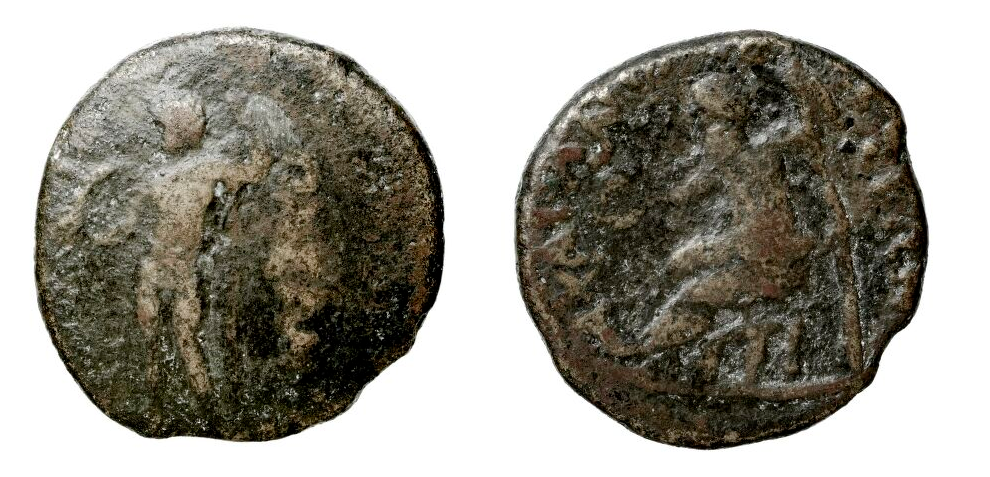S 392 - Phlius, bronze, 191-146 BC
From SILVER
191 BCE - 146 BCE Bronze
Description
| ObverseInscription or printing placed on the obverse.: | Zeus Homarios left, naked, holding Nike stephanephoros in right hand and scepter in left hand. In field, ΠΑΣΩΝ. Border of dots. |
| ReverseInscription or printing placed on the reverse.: | AXAIΩN ΦΛΕΙΑΣΙΩΝ (Greek).Personification of Achaea seating left, wearing chiton and peplos, holding wreath in right hand and scepter in left hand. Border of dots. |
Mint and issuing power
| MintIdentifies the place of manufacture or issue of a numismatic object.: | Phlius | Ancient regionAncient region.: | Peloponnesus | Modern countryModern country: Greece | AuthorityIdentifies the issuing power. The authority can be "pretended" when the name or the portrait of X is on the coin but he/she was not the issuing power. It can also be "uncertain" when there is no mention of X on the coin but he/she was the issuing power according to the historical sources: | Achaean League |
Chronology
| FromIdentifies the initial date in a range assigned in a numismatic context. | 191 BCE | toIdentifies the final date in a range assigned in a numismatic context.. | 146 BCE | PeriodTime period of the numismatic object.: Hellenistic 323-30 BC |
Physical description
| MetalThe physical material (usually metal) from which an object is made.: | Bronze |
DenominationTerm indicating the value of a numismatic object. Examples: tetradrachm, chalkous, denarius.: | StandardStandard.: |
Image

S_392_-_Phlius,_bronze,_191-146_BC.png [1]
References
| Die study referencePublication of the study: | Warren 20071Warren 2007, p. 40-41, no. 703-738. | ||
| Coin series referenceReference to coin series study: | |||
Obverse dies distribution
| FrequencyFrequency of specimen in distribution. ᵖ | Number of obversesNumber of obverse dies. ᵖ (o) | % (o) | Number of coinsNumber of coins. (n) | % (n) | Die nameName(s) of the die(s). |
| 1 | 25 | 86.21 | 25 | 69.44 | 1, 2, 4, 5, 6, 7, 9, 10, 11, 12, 13, 14, 15, 17, 18, 19, 21, 22, 23, 24, 25, 26, 27, 28, 29 |
| 2 | 2 | 6.9 | 4 | 11.11 | 16, 20 |
| 3 | 1 | 3.45 | 3 | 8.33 | 8 |
| 4 | 1 | 3.45 | 4 | 11.11 | 3 |
| Total | 29 of 29 | 100.01 | 36 of 36 | 99.99 |
Reverse dies distribution
no distribution is available
Quantification
| Number of obversesNumber of obverse dies. ᵖ (o) | 29 | Number of singletons (o1)The number of singleton coins. ᵖ | 25 |
| Number of reverse diesNumber of reverse dies. (r) | 36 | Number of coinsNumber of coins. (n) | 36 |
| Coins per obverse dieNumber of coins per obverse die. (n/o) | 1.24 | Coins per reverse dieNumber of coins per reverse die. (n/r) | 1 |
| Reverse per obverse ratioRatio of obverse dies divided by reverse dies. (r/o) | 1.24 | Percentage of singletons (o1)number of coins (n) divided by the number of singletons (o1) ᵖ | 86.21 % |
| Original number of dies (O) (Carter 1983 formula)The estimation of the number of coins according to Carter 1983 ᵖ | 116.12 | Coins struck if 20,000 as average productivity per dieCoins made if the average productivity for obverses (according to Carter) is 20,000. ᵖ | 2,322,400 |
| Original number of dies (O) (Esty 2011 formula)The estimation of the number of coins according to the singleton formula in Esty 2011 ᵖ (O) | 149.14 | Survival rate if 20,000 as average productivity per dieSurvival rate if average productivity is 20,000. ᵖ | 0.00002 |
| Coverage (o = % of O) (Esty 1984 formula)Esty 1984 - coverage (% of O) ᵖ (o = % of O) | 30.56% | Die productivity if survival rate 1/2,000Average productivity if survival rate is 1/2,000. ᵖ | 620.05 |
| Weight of silver (in kg) if 20,000 coins per die (O = Carter formula)Carter 1983 * Median weight * 20000 (*10 if gold or electrum) ᵖ | n.a. | Die productivity if survival rate 1/5,000Average productivity if survival rate is 1/5,000. ᵖ | 1,550.12 |
Remarks
References
- ^ Warren, Jennifer A. W. (2007), The Bronze Coinage of the Achaian Koinon. The Currency of a Federal Ideal, Royal Numismatic Society Special Publication 42, London, xvi, 212 p., 39 pl.